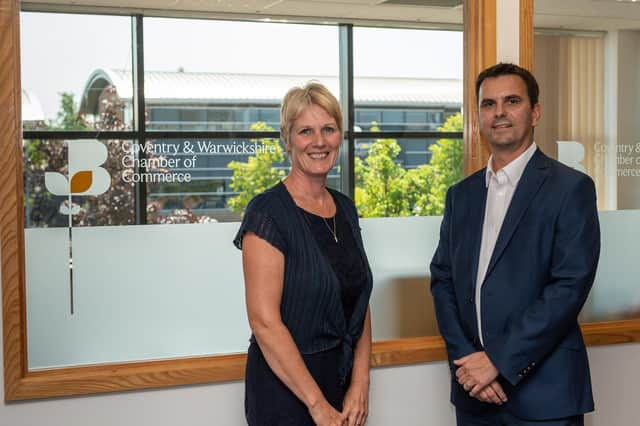Confidence of businesses in Coventry and Warwickshire tumbled at end of 2021 despite healthy sales, says new survey


Confidence among businesses in Coventry and Warwickshire took a tumble at the end of last year – despite sales and order books looking healthy in the final quarter, a new survey has revealed.
The Coventry and Warwickshire Chamber of Commerce’s latest Quarterly Economic Survey (QES) showed that fewer firms were looking ahead with confidence in the final three months of the year compared with the previous quarter, however the majority of business were still positive about the future.
Advertisement
Hide AdAdvertisement
Hide AdBoth sectors reported an uptick in both domestic and overseas sales but the survey suggested ongoing issues with Covid-19 as well as rising prices remain a drag on business optimism and the overall economic outlook.
The survey, which is delivered in partnership with Prime Accountants Group, is analysed by the Economy and Skills Group at Warwickshire County Council.
Its analysis uses a similar score to the national Markits Purchasing Managers Index (PMI) where 50 is the balance and anything above means the majority feel positive and anything below means the reverse.
In Coventry and Warwickshire, business confidence in the service sector dropped from 83.8 in the third quarter to 71.3 in the final quarter, while in manufacturing it fell from 62.9 to 55.8.
Advertisement
Hide AdAdvertisement
Hide AdThe rise in overseas and domestic orders was offset by a fall in investment and cashflow as 94 per cent of the manufacturers responding to the survey said that they expect price pressures to intensify.
Overall, it meant the outlook for Coventry and Warwickshire slipped from 59.7 to 57.9.
Sean Rose, head of policy at the Coventry and Warwickshire Chamber of Commerce, said: “It’s not surprising that confidence took a dip towards the end of 2021.
"With each passing quarter, it is important to remember what was happening in the previous three months to provide context.
Advertisement
Hide AdAdvertisement
Hide Ad“In the summer months, the economy was fully open for the first time after more than a year of restrictions so confidence was on the up.
"However, as we approached the end of the year Covid began to play a part in business sentiment and while restrictions haven’t impacted majorly, the rising number of cases has had an effect.
“Throw into the mix the major concerns around inflation and the rising costs of doing business, it’s little wonder that companies have started 2022 slightly more subdued than they were three months ago.
“However, the fact that the economic outlook is still on the positive side suggests that the economy in the region will continue to rebound in the coming weeks and months.”
Advertisement
Hide AdAdvertisement
Hide AdSunny Parekh, of Warwickshire County Council, said: “The results from Quarter Four’s QES presents a mixed bag of results leading to a slightly weakened picture of the economic and
business landscape within Coventry and Warwickshire.
“The overall economic outlook index in Q4 fell for a second consecutive quarter last year, signifying a slowing in the pace of expansion and optimism amongst the local business community.
“The final quarter of 2021 was dominated once again by a difficult operating environment for the manufacturing sector as inflationary pressure continued to mount, supply chains were strained and businesses experienced hiring difficulties.
“Contrastingly, the local service sector remained upbeat with an escalation in new orders both domestic and overseas, driven mostly by improved market conditions because of a sustained lifting of restrictions and a loosening of limits on international travel.
Advertisement
Hide AdAdvertisement
Hide Ad“As we begin 2022, we find ourselves in a familiar situation with Covid-19 case rates rising due to the emergence of the Omicron variant and another bout of restrictions being put in place to curb its spread.
“This will undoubtedly raise concerns amongst local businesses on how rising case rates (domestically and overseas), could impact demand levels, exacerbate any current labour/supply shortages and further price pressures.
"However, the impacts could be short- lived if the new variant is efficiently brought under control.”